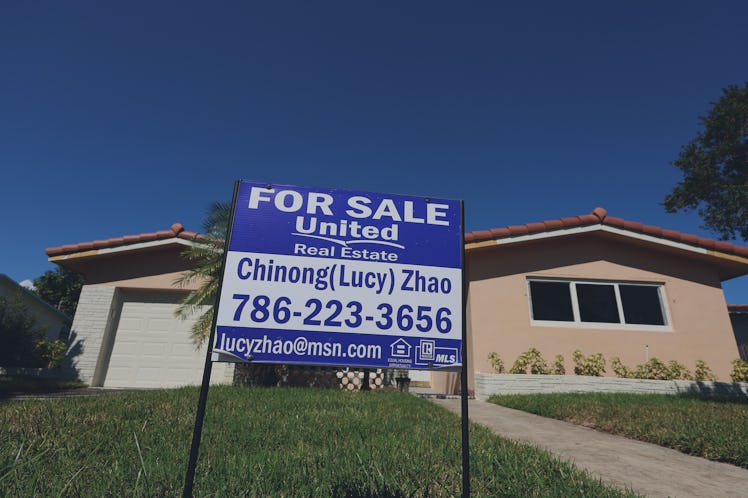Rent Costs Are Exploding. A New Bill Fighting “Wall Street Landlords” Might Help.
The “Stop Wall Street Landlords Act” could make it easier for first-time buyers who have been squeezed out of home ownership to enter the market.

Ask anyone who rents, and they’ll tell you the rental cost crisis is no joke. Compared to pre-pandemic pricing, rent prices have increased around 25% in the U.S., and the current average rent price is hovering at around $2,000 per month — a decrease of 2% from August. Rent in large metro areas is even higher. The average rent for a two-bedroom apartment in Manhattan is close to $2,500, and in L.A., renters shell out around $2,200 per month. That’s why it matters that three House Representatives just introduced a bill that would help alleviate parts of the rental crisis — something felt by many millions of Americans.
Just how many people rent? Some 36% of Americans rent their home, and 65% of Americans under 35 rent their homes. Renting is far more common among younger Americans — many of whom are parents — due to the sheer cost of home ownership. The median age of homebuyers is 47, and the median age of renters is 38, per Worth Insurance.
So this is no small group of Americans getting squeezed.
Why Is There A Rent Crisis?
There are a number of factors that led to the rent crisis facing Americans, but near the top of the list are corporate landlords. During the pandemic, when the housing market was on fire, investment companies and other corporate entities gobbled up available housing.
According to data from the Pew Charitable Trusts, corporate entities purchased almost 25% of single-family residences sold in 2021, using corporate leveraging to outbid actual buyers and edge young, low- to middle-income, and specifically Black and Hispanic, buyers out of the market altogether.
Homes were then placed on the renter’s market with eye-watering monthly price tags. Similarly, after months of rent moratoriums during the worst of the pandemic, existing landlords, eager to make up lost income, either sold their properties to corporations or jacked up rent prices.
The result is a rental landscape that is difficult, if not impossible, for many of the nation’s 40 million renters — many millions of whom are working parents — to make their monthly payments.
What Would The ‘Stop Wall Street Landlords Act’ Do?
Recognizing that the current state of rent in the U.S. is untenable for Americans, three members of the House of Representatives submitted a bill that would protect renters from corporate landlords and prevent rent gouging by investment firms and equity firms.
Representative Ro Khanna (D-Calif.) introduced the Stop Wall Street Landlords Act, co-sponsored by Katie Porter (D-Calif.) and Mark Takano (D-Calif.), in order to "deter future institutional investments" in the single-family residence market. If passed, the bill would impose additional taxes on current and future single-family residence purchases by corporations and investment firms.
“The financialization of the housing market by Wall Street exacerbates corporate profiteering and anti-competitive practices that makes it harder for Americans to afford housing or access homeownership,” said Representative Ro Khanna in a statement. “Low- and middle-income families in my district and across the country are being pushed out because of profiteering and unfair practices by large corporate landlords. This legislation will help level the playing field and put a stop to rent gouging in America.”
Per reporting from The Mercury News, the bill would also prevent large investors from claiming tax breaks on “mortgage interest, insurance, and depreciation deductions.” It would also “stop government-backed mortgage companies” (like Freddie Mac and Fannie Mae) “from buying and securitizing mortgages taken out by investors,” and would “levy a 100% transfer tax on the sale value of new single-family home purchases.” The bill would give large investors a grace period of 18 months after the bill becomes law to “sell properties and avoid the tax.”
“Wall Street should not be any family’s landlord,” said Representative Mark Takano in a statement. “As the housing crisis continues to plague the country, America’s middle class is acutely feeling the constraints of our nation’s low housing stock and increasing prices. Meanwhile, wealthy investors drive these costs up by monopolizing ownership of single-family residences. The Stop Wall Street Landlords Act takes the urgent steps needed to keep corporate investors out of the single-family housing market.”
For American families who have been reeling under the weight of exorbitant rent, the impact would be immense — especially now, at a time of record high inflation, skyrocketing medical costs, and unprecedented debt — by providing affordable rents and reestablishing home ownership as a reachable and realistic goal for American families.
This article was originally published on